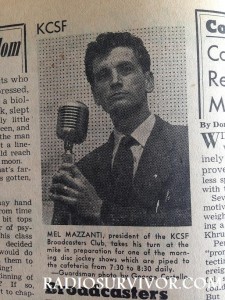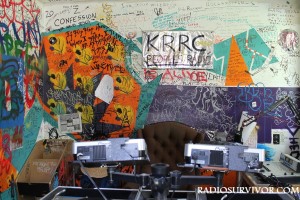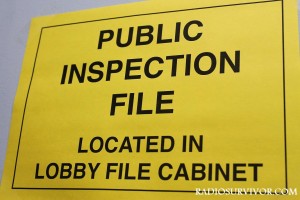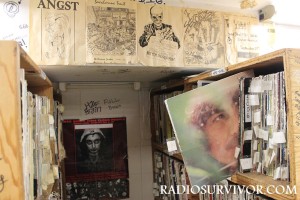 As I look back over 2013, I feel optimistic about the state of college radio, especially after a complicated 2012, a contentious 2011, and a challenging start to the 2000s. In November, 2013, I started writing weekly reports about college radio for our College Radio Survivor feature every Friday and for the most part, good news outweighed the bad last year.
As I look back over 2013, I feel optimistic about the state of college radio, especially after a complicated 2012, a contentious 2011, and a challenging start to the 2000s. In November, 2013, I started writing weekly reports about college radio for our College Radio Survivor feature every Friday and for the most part, good news outweighed the bad last year.
While there have been stations that have struggled and died over the past few years, in 2013 new college radio stations have been born and even more may be on the horizon. When the latest LPFM licensing window opened in October, 2013, around 100 college or university groups applied for new LPFM licenses.
It was particularly gratifying to see that groups from Rice University, Reed College, Portland State University, Bryant University, and Brown University (which all formerly had access to terrestrial licenses) are all in the running for new licenses. Additionally, ousted DJs from former FM student radio stations KUSF and WRVU are also among the groups hoping for LPFM licenses. After the FCC makes its way through all of the applications, I have no doubt that we’ll see some brand new LPFM college radio stations in 2014.
In my travels, I’ve been hearing that student enthusiasm for radio is high and that radio is still quite relevant to college students.
It’s not uncommon to hear about radio stations with 50-100 plus participants, even stations that don’t necessarily have a large audience. As an example of that, at tiny Wellesley College, student radio station WZLY is the largest campus organization, with more than 100 members. Beyond that, I was inspired this year by tales of dedicated college radio DJs, including a volunteer at WMBR who pulled an 8-hour shift during the lockdown in Cambridge, Massachusetts during the search for the Boston Marathon bombing suspect.
Student radio stations got some great news early in 2013 when the FCC announced that it would give student-run radio stations a bit of a break as far as fines for first-time violations.
College Broadcasters Inc. saw this as a hopeful sign and when the FCC asked for comments about its indecency policy, CBI advocated for college radio, asking the FCC to not fine student radio stations for inadvertent broadcasts of fleeting expletives.
Although there are many college stations hoping to obtain new terrestrial licenses, there are also college radio participants who are less wed to traditional radio. After Knox College opted to lease out space on its terrestrial radio station WVKC to a local public radio group, students at the station stated that they were OK with student radio migrating to an online and HD home. Station alumni weren’t as happy, arguing that this wasn’t a good deal for the station. Others on campus retorted that undergraduates don’t own terrestrial radios anymore. These debates will certainly continue with ever-changing technology.
2013 witnessed the return of many regular college radio events, including the third annual College Radio Day in October. The global event, attracted participants from more than 700 radio stations in 43 countries (and prompted a letter from President Obama). CBI and IBS also hosted conferences and awards competitions for student broadcasters, while CMJ continued publication of weekly music charts and hosted its annual College Day event and awards ceremony (see the 2013 winners here) during the CMJ Music Marathon in New York City. 
mtvU also gives some attention to college radio through its weekly college radio countdowns (hosted by a revolving list of stations) and annual Woodie Awards (University of Alaska station KSUA won the best college radio station title during SXSW in March). The Princeton Review list of the “most popular” radio stations happened again this year and although it’s not necessarily an indication of the best radio stations in the country, it does serve to highlight campuses with active radio communities.
Some College Radio License Sales…
Sadly, some stations did leave the air. WXLV-FM at Lehigh Carbon Community College was sold to a religious broadcaster. The FCC approved the license assignment in January, 2013. Student radio was expected to continue online. Penn College sold the license for WPTC after it discontinued the school’s mass media major. Thankfully, not all schools opt to get rid of radio stations when an academic program ends. Although St. Clair County Community College is eliminating its communications media program, it does plan to continue operations of WSGR-FM.
Spring Arbor University (SAU) in Spring Arbor, Michigan submitted paperwork with the FCC in order to assign the license for WJKN-AM to Jackson Lansing Catholic Radio (aka Good Shepherd Radio). The school owns several other radio stations and had been using the AM station as part of student radio training. Gardner-Webb University is also selling off its radio license for WGWG-FM to Columbia Bible College Broadcasting Company (a subsidiary of Columbia International University). It also seems likely that Camden County College in Blackwood, New Jersey will sell the 91.5 FM license for its 100 watt college radio station WDBK, with student radio continuing online.
Some Drama…
Every year there’s some sort of college radio controversy, whether its programming changes being handed down from leadership, station shutdowns, or sudden firings. I was happy to get the chance to visit WZRD in spring 2013 and confirm that all was well after the station’s DJ lock-out the prior year. However, there was unhappy news at KMSM over the summer when 18 volunteer DJs were dismissed from the Montana Tech FM radio station and the station was put on automation (reportedly until the fall).
And some new College Radio Stations…
Some new stations launched in 2013, including (but not limited to) an AM station at University of the Virgin Islands in January 2013, an online station at Lubbock Christian University, online radio station Hound Waves at Eastern New Mexico University, and LPFM hopeful WTJX at University of Virginia.
College Radio History at the Forefront in 2013
I’ve spent a lot of time this year working on projects related to the history of college radio. Over the summer I spent many hours in the archives of City College of San Francisco, digging up some fascinating articles about the history of the school’s radio station KCSF and broadcasting program. I’ve also been working with my alma mater Haverford College in order to plan a series of events during Alumni Weekend 2014 to celebrate the 90 year history of radio on campus. It’s been exciting talking to alumni from as far back as the 1940s and I can’t wait to hear more stories when we all convene for radio reunion in May.

KCSF story from 1958 in Guardsman newspaper in City College of San Francisco Archives (photo: J. Waits)
Since I am well aware of how challenging it can be to document college radio’s history, I was particularly excited to see some great projects in 2013, including a major exhibit at University of Maryland. Saving College Radio: WMUC Past, Present, and Future is part of a nearly year-long celebration of radio on campus and includes an exhibit of radio artifacts as well as a forthcoming panel discussion (which I am taking part in) in April.
Kudos also go to Tim Brooks for his exhaustive new book, College Radio Days: 70 Years of Student Broadcasting Dartmouth College, which chronicles the history of student radio at Dartmouth College. Brooks, who was involved with the radio station in the 1960s, even recounts his experience being on the air when word came out that JFK had been shot. Additionally, Arcane Radio Trivia’s Jose Fritz found some intriguing tidbits about the history of radio at Temple University.
As I reflect on the colorful history of college radio and some of the great strides made by college radio in 2013, I look forward to seeing what 2014 will bring.
We cover the culture of college radio every Friday in our College Radio Survivor feature. If you have college radio news to share, please drop us a note at EDITORS at RADIOSURVIVOR dot COM.






